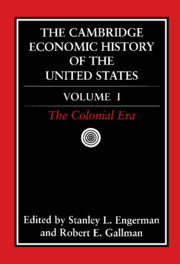Book contents
- Frontmatter
- 1 The History of Native Americans from Before the Arrival of the Europeans and Africans Until the American Civil War
- 2 The African Background to American Colonization
- 3 The European Background
- 4 The Settlement and Growth of the Colonies: Population, Labor, and Economic Development
- 5 The Northern Colonies: Economy and Society, 1600–1775
- 6 Economic and Social Development of the South
- 7 Economic and Social Development of the British West Indies, from Settlement to ca. 1850
- 8 British Mercantilist Policies and the American Colonies
- 9 The Revolution, the Constitution, and the New Nation
- Bibliographical Essays
- References
5 - The Northern Colonies: Economy and Society, 1600–1775
Published online by Cambridge University Press: 28 March 2008
- Frontmatter
- 1 The History of Native Americans from Before the Arrival of the Europeans and Africans Until the American Civil War
- 2 The African Background to American Colonization
- 3 The European Background
- 4 The Settlement and Growth of the Colonies: Population, Labor, and Economic Development
- 5 The Northern Colonies: Economy and Society, 1600–1775
- 6 Economic and Social Development of the South
- 7 Economic and Social Development of the British West Indies, from Settlement to ca. 1850
- 8 British Mercantilist Policies and the American Colonies
- 9 The Revolution, the Constitution, and the New Nation
- Bibliographical Essays
- References
Summary
For most of the sixteenth century, the landholding and trading classes of northwestern Europe imagined the New World, based on the example set by the Spanish and Portuguese empires, as a field for conquest, plunder, and dominion. When English, French, or Dutch adventurers trained their minds on the Atlantic and its western shores, they dreamt of precious metals seized from Spanish galleons and conquered Indian peoples, rich estates worked by Indian or European subjects and supervised by transplanted gentlemen, or lucrative trading posts where willing and naive Indians would trade away their high-valued wares for next to nothing. Such projects would reward their promoters, less in the hard-won profit margins of competitive trade than in booty, rents, swindle, royal favor, and sometimes in the sense of having done one’s duty for king, country, or the true faith. With a few magnificent exceptions, however, most of these adventures came to nought. They did not repay their investors, nor did they establish any of the north European countries as a significant colonial power. By the turn of the century, therefore, a new generation of adventurers – first in England and then more gradually on the continent – began to consider a change in strategy. Listening to the arguments of men such as Richard Hakluyt, they planned and promoted overseas settlements where Europeans would support themselves by raising staple commodities for sale in the Atlantic marketplace. This principle – that colonies could be sustained and investors rewarded from the profits of trade – remained the common denominator within all the successful overseas undertakings in the decades to come.
- Type
- Chapter
- Information
- The Cambridge Economic History of the United States , pp. 209 - 248Publisher: Cambridge University PressPrint publication year: 1996
References
- 3
- Cited by

